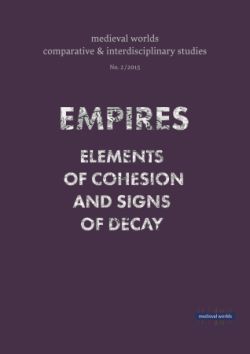|
 |
MEDIEVAL WORLDS provides a new forum for interdisciplinary and transcultural studies of the Middle Ages. Specifically it encourages and links comparative research between different regions and fields and promotes methodological innovation in transdisciplinary studies. Focusing on the Middle Ages (c. 400-1500 CE, but can be extended whenever thematically fruitful or appropriate), MEDIEVAL WORLDS takes a global approach to studying history in a comparative setting.
MEDIEVAL WORLDS is open to regular submissions on comparative topics, but also offers the possibility to propose or advertise subjects that lend themselves to comparison. With a view to connecting people working on related topics in different academic environments, we publish calls for matching articles and for contributions on particular issues.
Table of Contents
Walter POHL, Editor’s Introduction: Empires – Elements of Cohesion and Signs of Decay
Mayke DE JONG, The Empire that was always Decaying: The Carolingians (800-888)
Simon MACLEAN, Cross-Channel Marriage and Royal Succession in the Age of Charles the Simple and Athelstan (c. 916-936)
Andrew J. NEWMAN, ›Great Men‹, ›Decline‹ and Empire: Safavid Studies and a Way Forward?
Jeroen DUINDAM, Dynasties
Susan REYNOLDS, Nations, Tribes, Peoples and States
Glenn BOWMAN, Lieux Saints Partagés: An Analytical Review
ONGOING RESEARCH PROJECT
Johannes PREISER-KAPELLER, Calculating the Middle Ages? The Project »Complexities and Networks
in the Medieval Mediterranean and Near East« (COMMED)
The journal is funded by the Austrian Science Fund (FWF).

|




 Home
Home Print
Print
 References
References
 Share
Share
